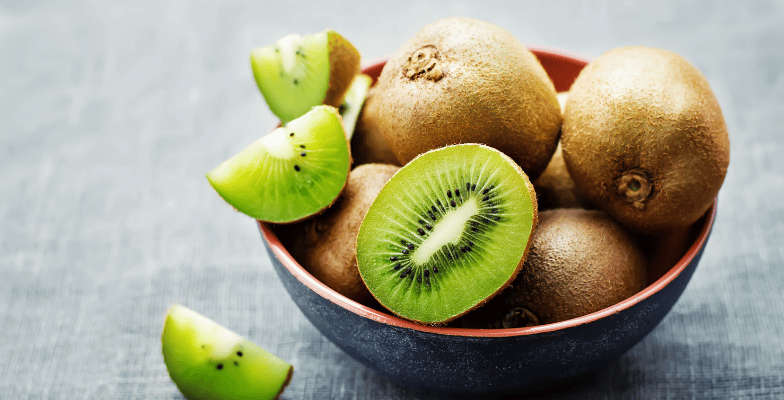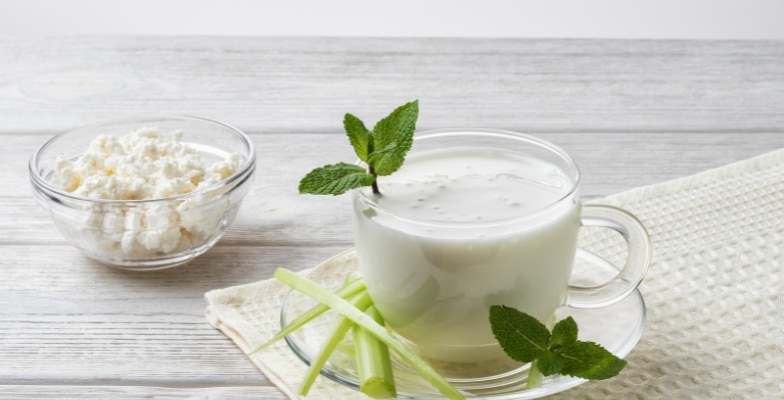Kiwi Nutrition Facts And Health Benefits
- Kiwi Nutrition Facts
- Kiwi Benefits For Health
- How To Eat Kiwifruit
- Kiwi Safety Concerns
- Conclusion And My Recommendation

Small but effective, kiwi or Chinese gooseberry, also called kiwifruit, has an interesting history. The fruit is originally from China. In 1904, a teacher returned to New Zealand with kiwi seeds and introduced them to the citizens. Botanically, the kiwi is a berry from the genus Actinidia.
It has edible skin, light green, light brown, or golden flesh, and edible black seeds. Kiwis have a soft texture and a sweet, unique taste. New Zealanders named the fruit kiwi after their national bird. 1https://www.ncbi.nlm.nih.gov/pmc/articles/PMC6267416/
Their small size doesn’t stop them from being a powerhouse of antioxidants and other nutrients. Kiwi’s health benefits are tremendous.
Kiwi Nutrition Facts
To know your daily quota of each nutrient, you may check the link. 2https://health.gov/our-work/nutrition-physical-activity/dietary-guidelines/previous-dietary-guidelines/2015 GI (glycemic index) measures how quickly foods raise blood sugar. If a food has a low GI (1 – 55), it increases blood sugar slowly, which is good, especially for diabetics.
Moderate GI ranges from 56-69, while 70 or more is considered a high GI. Kiwi has a GI of 58, which is just above the low range, meaning it is safe for diabetics. However, if you have diabetes, consider consulting your doctor before adding kiwis to your regular diet. 3https://www.glycemicindex.com/foodSearch.php?num=1331&ak=detail
Related Article: What Is Glycemic Index | Food List With Glycemic Index
Kiwi Benefits For Health
May Improve Respiratory Health
Kiwi is an excellent source of vitamin C and other antioxidants, which is beneficial for people with respiratory diseases like asthma. According to the British Medical Journal, regular consumption of fruits rich in vitamin C, including kiwi, has a beneficial effect on the lungs.
Consuming kiwis was associated with a decrease in wheezing. 4https://thorax.bmj.com/content/55/4/283.full A study by the British Journal of Nutrition also suggests that eating four golden kiwis a day may help reduce symptoms of respiratory tract infection. 5https://www.cambridge.org/core/journals/british-journal-of-nutrition/article/consumption-of-gold-kiwifruit-reduces-severity-and-duration-of-selected-upper-respiratory-tract-infection-symptoms-and-increases-plasma-vitamin-c-concentration-in-healthy-older-adults/21FADFCDA9B1CE84BF9FE2476B1A2AC4
May Boost Immunity
We all know the significance of having strong immunity, especially today. Vitamin C in kiwi is essential for boosting immunity and helping to fight diseases. 6https://pubmed.ncbi.nlm.nih.gov/29099763/ According to the Canadian Journal of Physiology and Pharmacology, kiwi may support immune function and reduce cold and flu incidence in at-risk groups such as older adults and children. 7https://cdnsciencepub.com/doi/abs/10.1139/cjpp-2012-0303#.WEW-VKOZORv
Supports Skin Health
Kiwi has many benefits for the skin. Collagen is a protein that contributes vastly to skin health by enhancing elasticity, reducing wrinkles, and healing wounds. The vitamin C in kiwi aids in collagen synthesis.
Kiwi also contains tocopherol, the major form of vitamin E. One animal study revealed that topical use of vitamin E reduced acute and chronic damage from UV irradiation, as reported by the journal Nutrition and Cancer. That said, using kiwi externally on your skin may do wonders. 8https://pubmed.ncbi.nlm.nih.gov/11341050/
May Lower Blood Pressure
High blood pressure is a significant risk factor for strokes and heart attacks, and eating kiwis might help lower it. One study tested 118 subjects with stage-1 hypertension.
They were randomized to eat three kiwis or one apple a day for eight weeks. After eight weeks, the group that ate three kiwis a day had lower blood pressure than those who ate one apple a day. 9https://pubmed.ncbi.nlm.nih.gov/25483553/ By lowering blood pressure, the nutrients in kiwi may also reduce the risk of strokes and heart attacks.
May Prevent Constipation
One 2019 study concluded that healthy individuals eating kiwis had better water retention in the small intestine, increasing stool volume, frequency, and consistency.
The study also suggested that kiwi could be an alternative to laxatives for mild constipation. 10https://www.ncbi.nlm.nih.gov/pmc/articles/PMC6590324/ The fiber in the kiwi also helps make bowel movements smooth.
Related: What Is Fiber? Health Benefits, Food Sources And Daily Requirements
May Prevent Chronic Diseases
Many factors can cause oxidative stress, including ozone, certain pesticides, cigarette smoke, radiation, and pollution. Oxidative stress can damage our DNA, leading to several chronic health issues like cancer, heart disease, and diabetes.
There is evidence that eating kiwi or kiwi extracts have a protective effect against oxidative stress. Kiwis have antioxidants that make this possible. 11https://pubmed.ncbi.nlm.nih.gov/11588897/
How To Eat Kiwifruit
Here are a few ways you can add kiwi to your diet.
-Wash them and eat them raw.
-Make a mocktail by adding mango, strawberries, grapes, or any of your favorite fruit to kiwis.
-Include them in smoothies with other fruits and vegetables.
-Cut kiwis into small pieces and add them to yogurt or salads.
-Freeze kiwis and eat them as dessert during summer.
-If you don’t like the fudgy texture of kiwi skin, you can leave it out. Cut kiwis into halves and slide a spoon around the inner fruit to separate the skin, or simply peel the skin off as you’d do for cucumber.
However, kiwi skin is very nutritious. It provides 30-50 % more fiber, folate, and vitamin E than the flesh alone.
Kiwi Safety Concerns
Kiwi is considered safe for most people; however, use caution under the following conditions:
-Mild allergy symptoms include itchy throat, swollen tongue, difficulty swallowing, hives, vomiting, tingling lips, and sore mouth. Severe but rare symptoms comprise difficulty breathing and loss of consciousness, wheezing, and blue lips.
-Allergy symptoms are most likely to occur in children under 15 years of age. If your child is eating the fruit for the first time, observe him/her closely.
-Your chances of developing a kiwi allergy increase if you are already allergic to hazelnuts, avocados, wheat, latex, figs, or poppy seeds. Although uncommon, kiwis can slow blood clotting, leading to bleeding in people with bleeding disorders.
Remember, the ideas in this article are not a substitution for medical advice. If you have health concerns, it’s best to talk to your doctor before adding any food to your diet.
Conclusion And My Recommendation
You already know how the Chinese gooseberry became known as the kiwi. And I am sure you also know why it was carried to a foreign country and became a hit worldwide. It happened because of its vast nutrient content and health benefits.
Kiwi is rich in vitamins, minerals, and antioxidants. It also has a good amount of fiber. And surprisingly, a kiwi has a higher concentration of vitamin C than an orange.
Kiwi has many health benefits. It may help improve respiratory health, boost immunity, lower blood pressure, relieve constipation, protect against chronic disease, and improve skin.
The number of kiwis you need to eat to get these benefits depends on several factors, such as age and health status. Typically, one to three kiwis daily are appropriate for most healthy individuals. In my view, kiwi is an excellent fruit to eat. So, let’s say ahoy to kiwis.
What do you think of this article? Have any questions? Let me know in the comments below!

Skill-Based Education.
Global Recognition.
Powerful Community Building
Secure a certificate of completion in as little as a day by graduating from one of our free courses.
Get Access to Our Free Courses. No Credit Card Required.

Fabulous Body Membership
Your All-Access Pass to A Fabulous Body & A Rewarding Career
25+ Certificate Courses & Programs, All Included
15 Day Free Trial, 100% Money-Back Guarantee
About Rohit Kumar
Rohit Kumar is an avid writer who puts a lot of his emotions in words through his articles. Today, he is a certified fitness expert with a vast knowledge on nutrition and has contributed to the pages of Fabulous Body with his articles.










